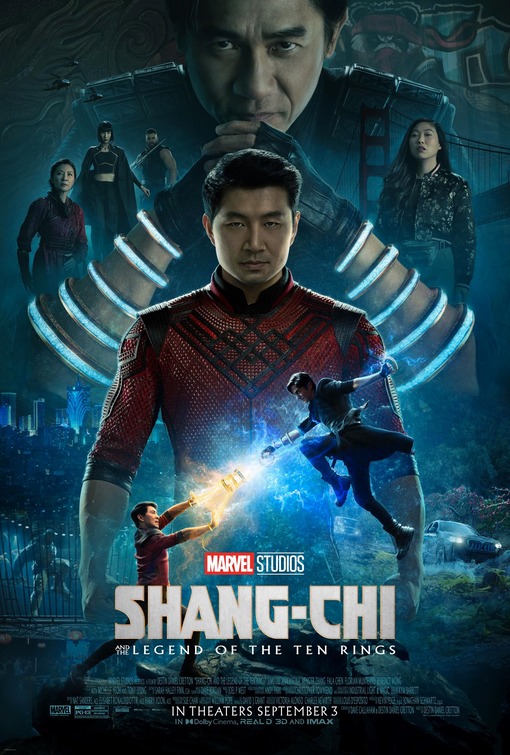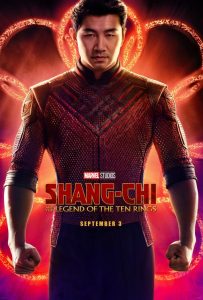Posts Tagged ‘Ben Kingsley’
The Heart of the Dragon
Shang-Chi and the Legend of the Ten Rings

Director: Destin Daniel Cretton
Cast: Simu Liu, Awkwafina, Tony Chui-Wai Leung, Ben Kingsley, Meng’er Zhang, Michelle Yeoh, Mark Ruffalo, Florian Munteanu
Film rating: 7 out of 10
Running time: 2 hours and 12 minutes

The Glass Castle director Destin Daniel Cretton certainly landed a massive task in directing the Oriental fantasy film Shang-Chi and the Legend of the Ten Rings assembling a mostly Chinese cast with Chinese Canadian actor Simu Liu in the lead role as Shang Chi and comedian, rapper and Golden Globe winner Akwafina (The Farewell) as his sidekick Katy.

While Shang-Chi and the Legend of the Ten Rings starts off promisingly with some thrilling action sequences on the streets of San Francisco followed by an equally brilliant fight sequence in an abandoned skyscraper in Macao in China, the rest of the CGI laden fantasy epic just eventually unravels into a simulacrum of the Tales of Narnia mixed with some strange dragon sequences which clearly resemble the final season of HBO’s Game of Thrones.

Then there is the problematic appearance of Oscar winner Ben Kingsley (Gandhi) popping up in such a crazy heavily laden special effects film. Does Ben Kingsley really need the money or did Marvel pay him an extraordinary fee to appear in this confusing martial arts fantasy epic which tries desperately to tag along to the more mainstream Avengers films? One wonders.

After the brilliance of Black Widow, Shang-Chi and the Legend of the Ten Rings, despite making an absolute fortune at the overseas box office, is not as well written or directed or even constituted as an action adventure fantasy.
This Marvel venture is certainly entertaining but at 2 hours and 12 minutes, the middle section of the film drags continuously as does the epic dragon battle sequence at the end which is a rehash of other similar Marvel films and nothing unique.

Despite the film industry being in turmoil since the global Pandemic, it is good to know that Marvel is trying to cover all their bases in terms of target markets but seriously Shang-Chi and the Legend of the Ten Rings could have been so much better and taken inspiration from such superb martial arts films as director Ang Lee’s Oscar winning Crouching Tiger, Hidden Dragon especially considering it lured Bond star Michelle Yeoh (Tomorrow Never Dies) to appear in this film too.
Shang-Chi and the Legend of the Ten Rings is entertaining and has already made its box office takings but as a film, this could have been absolutely brilliant but then again Marvel are just cashing in on the current cinematic trend and appealing to that massive target market in China which has the world’s largest cinema going population outside of India.
This action adventure fantasy gets a film rating of 7 out of 10. It’s fun but not amazing. Catch it in cinemas or on a streaming site in the future.
Tightrope between the Twin Towers
The Walk
Director: Robert Zemeckis
Cast: Joseph Gordon-Levitt, Charlotte le Bon, Ben Kingsley, Clement Sibony, Cesar Domboy, James Bade Dale
Joseph Gordon-Levitt attempts a dubious French accent as Philippe Petit a High Wire Artist who is hell bent on walking across a tightrope between the newly constructed Twin Towers in New York City.
Director of Castaway and Flight, Robert Zemeckis’s film The Walk is both captivating and thrilling as he takes audiences on a journey of Philippe and his outstanding feat of walking a tightrope between the Twin Towers just as they are being completed back in 1974. What is more fascinating is that Zemeckis uses The Walk as a cinematic memorial to the infamous towers which came crashing down in the terrorist attacks in September 2001, without making reference to their eventual downfall twenty seven years later.
Whilst The Walk is set in Paris and New York, Zemeckis does not fall into the trap of ending the film with a line about the devastation of the World Trade Center Towers, but rather uses the film to pay tribute to the fantastic engineering feat of these twin towers during the 1970’s and the inspiration they gave to the crazy, obsessive French man Petit, exuberantly played by Gordon-Levitt who, with the help of a motley crue of accomplices pulls off the illegal stunt of crossing between the iconic skyscrapers one morning in May 1974, despite a multitude of setbacks.
Unimaginatively titled, The Walk is not a perfect film and the only criticism is that of Petit’s character narrating his story directly to the cinema audience, but the film nevertheless remains light as a crazy and nostalgic look at one man’s determination to follow his dreams, knowing that if he achieves this feat he would become infamous and garner considerable media attention.
Thankfully the rest of the cast are French including Charlotte le Bon as Petit’s patient girlfriend Annie and Clement Sibony, both last seen in the charming film The Hundred Foot Journey as Jean-Louis, Philippe’s photographer friend who is given the task of capturing all of Petit’s tightrope antics including an earlier performance of walking between the towers of the Notre Dame in Paris.
Gordon-Levitt, whose slim build and natural onscreen energy is perfectly cast as the ambitious Philippe Petit and Oscar winner Ben Kingsley (Life, Gandhi, Sexy Beast) is cast as the Czech highwire artist Papa Rudy who Petit befriends at the Circus to assist him with some much needed acrobatic training.
For all its daring bravado and not to mention his obvious lack of a fear of heights, Petit’s triumph is of making the performance of being a high wire artist truly spectacular. The Walk is a fun-filled captivating story about one man’s ambition to perform the impossible act, caught at a specific moment in history when skyscrapers were still a novelty on any city’s skyline.
The Cusp of Fame
Life
Director: Anton Corbijn
Cast: Dane DeHaan, Robert Pattinson, Joel Edgerton, Stella Schnabel, Alessandra Mastronardi, Ben Kingsley, Peter Lucas
Like Simon Curtis’ s film My Week With Marilyn, director Anton Corbijn’s handsomely made film Life offers a glimpse into a slice of iconic screen legend James Dean’s life, a couple of months before his untimely death on the 30th September 1955 as seen through the lens of acclaimed photographer Dennis Stock.
Corbijn’s films including The American and A Most Wanted Man are considerably measured in approach and give the actors a chance to inhabit their characters on screen. The casting of Dane DeHaan (The Devil’s Knot, Lawless) as the reluctant star James Dean and Robert Pattinson (Cosmopolis, Twilight) as the struggling photojournalist Stock who sees in Dean a potential symbol for the rising counter-culture in the American society exemplified in the Beat Generation especially writers like Jack Kerouac and Allen Ginsberg who become infamous in the latter years of the 1950’s.
DeHaan who also starred as Lucien Carr in Kill Your Darlings, which also focused on this particular era is beautifully cast as the selfish, enigmatic and moody James Dean who is literally on the cusp of fame.
Life, which takes place in 1955, as Dean has just starred in Nicholas Ray’s film East of Eden and is on the brink of getting the part in Rebel Without a Cause.
DeHaan intensely inhabits the role of James Dean and Pattinson is brilliant as the struggling photographer Stock who on a whim decides to follow his itinerant subject from Los Angeles to New York and then to his home town of Marion, Indiana.
Its James Dean’s encounter with Jack Warner of Warner Brothers where he first realizes that he is a pawn in the powerful studio system. Warner is played with panache and brutality by Oscar Winner Ben Kingsley (Gandhi, Sexy Beast) who even says to Dean “You belong to me now.”
DeHaan superbly shows James Dean’s reluctance at being controlled as he mysteriously leaves New York to visit his relations in Indiana, not before Stock poignantly manages to capture that iconic black and white image of James Dean, wearing a trench coat, strolling nonchalantly through Times Square New York in the rain, smoking a cigarette.
Whilst the script of Life is by no means as witty as My Week with Marilyn, causing the narrative to meander considerably in the middle act of the film, it does offer viewers a glimpse at an enigmatic superstar who after three films become such a Hollywood icon just as his life was cut short in a fatal car crash: Life of James Dean.
 Ironically Dennis Stock’s images of James Dean were immortalized much like the star he was photographing. Audiences should look out for cameo appearances by director Julian Schnabel’s daughter Stella Schnabel as Norma and Italian actress Alessandra Mastronardi as Dean’s initial love interest, actress Pier Angeli along with Joel Edgerton as John Morris.
Ironically Dennis Stock’s images of James Dean were immortalized much like the star he was photographing. Audiences should look out for cameo appearances by director Julian Schnabel’s daughter Stella Schnabel as Norma and Italian actress Alessandra Mastronardi as Dean’s initial love interest, actress Pier Angeli along with Joel Edgerton as John Morris.
What is clearly emphasized in Life, was James Dean’s ambition to be an actor which he was passionate about without wanting to participate in his film’s publicity, premieres and red carpet obligations that he would notoriously shy away from.
Watching Life in a 21st century, celebrity obsessed context, James Dean would never have survived had he been born half a century later, despite his immense talent and gorgeous baby-faced good looks. Life is a fascinating portrait of two men, of subject and photographer, who both at some point realize that their unique friendship would be fleeting, yet have a lasting impact on the public perception of what constitutes a screen icon.
Recommended viewing for those that enjoy languid biopics without the wit or profound resonance often associated with films about hugely famous people. By no means a masterpiece, Life is certainly fascinating viewing and affords a moody opportunity to see DeHaan and Pattinson onscreen together.
Packing for the Promised Land
Exodus: Gods and Kings
Director: Ridley Scott
Cast: Christian Bale, Ben Kingsley, Joel Edgerton, John Turturro, Aaron Paul, Sigourney Weaver, Ben Mendelsohn, Ewen Bremner, Maria Valverde
After the success of Gladiator and Robin Hood, British director Ridley Scott tackles the Book of Exodus in his ambitious cinematic reworking aptly titled Exodus: Gods and Kings, dedicated to his deceased brother director Tony Scott (True Romance, Top Gun, Man on Fire).
Exodus: Gods and Kings, starts when Moses is a muscular young man taken into the ancient Egyptian court of Seti the supercilious Pharoah played by John Turturro whose son and heir apparent Ramses played by Joel Edgerton becomes like a brother to Moses. All sibling affection soon vanishes, when Moses visits the enslaved Israelites who are forced to build pyramids, sphinxes and tombs to the Egyptian kings.
Moses played by Oscar winner Christian Bale leaves Egypt and sets off for Midian where he meets his future wife Zipporah played by Spanish actress Maria Valverde. While in Midian, Moses is visited by God in the form of a vengeful boy who promises to free the Israelites from Egypt and set curses upon the ancient land. God makes Moses a leader and instructs him to lead the Israelites out of Egypt into the promised land of Canaan.
After several years of marital bliss, Moses returns to Egypt to discover that the brutal and vain Ramses has taken power and forced the Israelites into an entrenched and vicious slave labour, while the ancient Egyptians live an idle life.
Once the ten plagues of Egypt have cursed the land of the Nile completely, Ramses will banish the Israelites from Egypt into the desert of Sinai and cinematically these ten curses upon the House of Ramses are brilliantly recreated from rivers of blood to the seminal deaths of the first born Egyptian sons including that of Ramses heir, whilst the Israelite first born sons are spared during the Passover.
In Exodus: Gods and Kings, naturally the narrative is completely biblical and sure to be controversial depending on which religious context the viewer is watching this film in. Besides the religious and historical aspects, Exodus: Gods and Kings is an ambitious saga which unfortunately suffers from the weight of its own importance along with a poorly written dialogue which makes the character development flimsy and almost predictable.
This is a pity considering the fantastic ensemble cast which Scott commands including Sigourney Weaver whose part as Tuya barely registers in the overall narrative along with Ben Kingsley as Hebrew leader Nunn and an unrecognizable Aaron Paul (The Need for Speed) as Joshua.
Besides the two main leads with Bale going through the motions as Moses and Joel Edgerton is slightly better as the confused and curse stricken Egyptian king Ramses, Ben Mendelsohn shines as a camp Viceroy Hegerop who lives a debauched life away from the ancient Egyptian city of Memphis.
Maria Valverde is convincing as Moses long suffering wife Zipporah who is also basically neglected in an overtly patriarchal narrative which gives little credence to any of the female characters in the story. Sigourney Weaver’s Tuya suffers a similar fate, merely feeling a presence without any significant motivation.
As a film, Exodus: Gods and Kings could have been so much better, including more lavish cinematography, better acting and a more intelligent handling of the Book of Exodus which is complex enough as a religious text, thus making it even more difficult to translate this biblical story into a relevant 21st century cinematic narrative.
In terms of Ridley Scott’s excellent filmography including A Good Year, Gladiator, Blade Runner, Thelma and Louise, Exodus: Gods and Kings can be considered his least successful film, yet it will be his most provocative and talked about.
Whether it’s a complete disaster of biblical proportions or a genuine retelling of Moses leading the Israelites into the promised land of Canaan, Exodus: Gods and Kings will be judged historically entirely by the viewer’s frame of reference, religious beliefs, gender and socio-political perspective. Recommended viewing for those that enjoyed Darren Aronofsky’s Noah, Gladiator or long biblical spectacles such as the 1956 Charlton Heston epic The Ten Commandments.
Sexual Repression in Film
Maurice
Director: James Ivory
Cast: Hugh Grant, James Wilby, Rupert Graves, Ben Kingsley, Denholm Elliott, Phoebe Nicholls, Helena Bonham Carter, Judy Parfitt, Simon Callow
Cinema Lovers Workshop on Sexual Repression in Film presented as part of the 4th Durban Gay and Lesbian Film Festival 2014 http://www.dglff.org.za/ on Thursday 26th June 2014 at the KZNSA Gallery, Durban.
Director James Ivory’s 1987 film Maurice is a nuanced and delicate study of sexual repression in the Edwardian era based upon the posthumously published novel by the acclaimed British novelist E. M. Forster who also penned Howards End, A Room with A View and his most famous novel, A Passage to India.
At the beginning of Maurice, Maurice Hall’s tutor, played by Simon Callow standing on an English beach instructs the young boy that “Your body is your temple”, a sentiment echoed by the Victorians.
The film moves to 1909 when Maurice Hall played by James Wilby and Clive Durham played by Hugh Grant are at Cambridge together and over a classical tutorial discuss the notion of words versus deeds. The post-Victorian early Edwardian attitude towards sex was prohibitive and repressive.
Whilst reading Classics at Cambridge, there is an early reference to the “Unspeakable Vice of the Greeks” which is seen by the Edwardians as a strong rejection of Western Christian principles in favour of Mediterranean hedonism and unadulterated sexual desires. Maurice also establishes a close link between all male sports such as cricket and boxing and the forbidden homosexual love between men which was naturally more than fraternal.
Viewers must bear in mind that Maurice is set not even 20 years after the infamous trial of Oscar Wilde in 1895 when he was accused and convicted of sodomy and sentenced to two years hard labour so beautifully documented in the 1997 Brian Gilbert film Wilde starring Stephen Fry, which forced the majority of repressed homosexuals in late Victorian London to flee to the continent.
Under the shadow of the Oscar Wilde affair, homosexuality was considered the worst crime in the calendar, making the environment of Edwardian England sexually repressive for the lead characters in Maurice. Ultimately Maurice charts the doomed love affair which starts at Cambridge of Maurice Hall who was suburban middle class and Clive Durham which came from Landed Gentry and was a symbol of inherited wealth being the only son in the family who would inherit the country estate Pendersleigh Park.
Interestingly, many Edwardian homosexuals to avoid scandal married each other’s sisters to continue an illicit gay love affair post marriage. Many suspected homosexuals in England prior to the outbreak of World War 1 were arrested on charges of soliciting and immorality. This is exemplified in the film by the scandalous arrest of Lord Risley, who was arrested while trying to pick up a soldier in an alleyway and publicly named and shamed in the press, suffering a similar fate to Oscar Wilde without the associated sensational publicity. Lord Risley was sentenced to six months hard labour.
In this repressive society, the fearful and closeted Clive Durham rebukes Maurice’s affections for fear of scandal and being charged with immorality especially as he is due to inherit the family’s gorgeous country estate. By 1912 and after a brief visit to Greece, Durham returns and breaks off all romance with Maurice and promptly marries the naïve Anne Woods played by Phoebe Nicholls recently seen in Downton Abbey leaving Maurice angry, jilted and heartbroken.
Maurice turns his sexual frustration to boxing in Bermondsey and considers that he is suffering from an unspeakable disease consults a doctor and a hypnotist Lasker-Jones wonderfully played by Ben Kingsley who aptly suggests that Maurice flee England and live abroad in a country more accepting like France or Italy.
The third part of the film takes place around Pendersleigh in 1913, the country estate owned by Clive Durham who is approaching his nuptials with Anne. At this estate works an unconventional and almost pastoral figure Scudder beautifully played by Rupert Graves, who is an underkeeper and not afraid to wear his sexuality on his sleeve. The character development of Maurice is evident in the film and soon he succumbs to the opportune sexual advances of Scudder who enters into Maurice’s bedroom at Penderleigh through an open window and promptly seduces him. The central character’s development goes from emotional innocence to sexual experience and is expertly played by Wilby who along with Hugh Grant both won Best Actor awards at the 1987 Venice International Film Festival.
In a series of interesting hypnosis scenes between Kingsley and Wilby, it is suggested that a cure for his characters sexual urges to those of the same sex should be to play sport and carry a gun. As Maurice and Scudders sexual relationship blossoms within the confines of a Country Estate, the scenes with Maurice by the window become symbolic of his character being trapped in a sexually repressive environment with Scudder being the one who ultimately releases Maurice from this sexual and moral dilemma. Scudder plans on fleeing the strict rules of Pendersleigh and emigrating to the Argentine and whose only crime is bring guilty of sensuality.
Maurice and Alec Scudder’s eventual reunification at the boat house is a way for Maurice to decisively escape the repressive environment he find himself in, ultimately leaving the pompous Clive Durham, repressed and stuck in a loveless marriage to Anne Woods. The closing shot of the film is one of Clive Durham closing the window and himself into a stifled existence, symbolic of a generation of Edwardian young men who have yielded to social conventions like marriage and sexual repression. A repression which was ultimately was to be broken by the outbreak of World War II in 1914.
After the success of A Room with a View, Maurice was a continuation in a long line of lucrative and Oscar winning Merchant Ivory Productions and securing James Ivory a Best Director prize at the 1987 Venice Film Festival and can be seen as a prelude to his more successful films like Howards End and the adaptation of Kazuo Ishiguro’s novel The Remains of the Day.
In terms of the history of queer cinema, director James Ivory’s Maurice is a superb cinematic starting point to examining what it was like to be gay in a sexually repressive environment over a century ago. Thankfully society and the film industry has developed significantly since then, flinging open the glass closet doors of Hollywood.
Suggested Reading:
Maurice by written E. M. Forster
Morgan, A Biography of E. M. Forster written by Nicola Beauman
Upgrading the DNA
IRON MAN 3
Director: Shane Black
Cast: Robert Downey Jnr, Gwyneth Paltrow, Ben Kingsley, Don Cheadle, Rebecca Hall, James Badge Dale, Jon Favreau, Miguel Ferrer, Paul Bettany
Kiss Kiss Bang Bang director Shane Black reunites with Robert Downey Jnr in the third instalment of the highly successful Iron Man franchise in Iron Man 3. Whilst the third film lacks the panache of the original Iron Man, Iron Man 3 will definitely appeal to its target male audience and features a bigger role for the superhero sidekick Pepper Potts, played with a muscularity by Gwyneth Paltrow. Don Cheadle returns as the army officer suiting up the Iron Patriot. Iron Man 3, with the exception of a brief prelude in Bern Switzerland, stays firmly within the cultural pastiche of 21st century America from Malibu to Chattanooga to Miami.
Especially relevant now, the enemy in Iron Man 3 is a psychopathic superhuman terrorist, The Mandarin, who is seemingly terrorising key points in the USA from the Graumann Theatre in downtown Hollywood to Air Force One, mid air over Florida with an explosive chemical manipulation of man’s DNA. As a sideline there is the supposedly geeky rival scientist Aldrich Killian first introduced in Bern, played with a marvelous dexterity by Australian actor Guy Pierce, an antithesis of all that Iron Man’s alter ego Tony Stark represents from boyish charm, sophisticated genius and suave, billionaire industrialist.
Unfortunately unlike Iron Man and Iron Man 2, with the wonderful Mickey Rourke as the villain flinging racing cars through the air at the Monte Carlo Grand Prix, the villain in this third installment is not as clearly defined, nor is he as ruthless and cunning yet equally clever and what imbalances appear on screen, is made up for by the witty script and loads of stunning action sequences from the demolition of Tony Stark’s Malibu Mansion, to a unrivaled skydiving sequence.
Fresh from the attack of Loki’s avenging Nordic demons on the Manhattan skyline in 2012’s smash hit The Avengers, Iron Man is more fragile and less strong as he first appears, suffering from anxiety attacks and insomnia and seeking refuge in his robotic world of remote controlled Iron Men, Tony Stark soon finds the inner parent in him as he befriends Harley a Tennessee tech-savy youngster as he investigates a mysterious explosion in the Southern town close to Chattanooga in a bid to rebuild his Iron Man suit and save Pepper Potts from the clutches of the elusive villain, the internet waging, cultural terrorist The Mandarin…
Whilst there are some fantastic action sequences and Downey as usual embodies all the likable characteristics of Tony Stark, aka Iron Man, the third installment of the series lacks a tighter narrative, with many inexplicable plot points not being resolved in favour of big budget action sequences. Iron Man 3, immersed in contemporary cultural references from Joan Rivers to Downton Abbey has some hugely entertaining sequences especially the Malibu and Tennessee sections but lacks some of the inherent style and flamboyance of the first two films, and also points to a rather disturbing subtext that many violent episodes in 21st century American society are at the hands of those from within the nation, and not some foreign malevolent power.
Nevertheless, the action and script makes up for any plot deficiencies and Iron Man 3 is fun for a gang of teenage boys to watch. Also starring the underutilized Rebecca Hall (Vicky Christina Barcelona) and Oscar Winning Ben Kingsley which begs the question what were these fine actors doing in such a comic book sequel?













